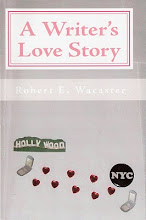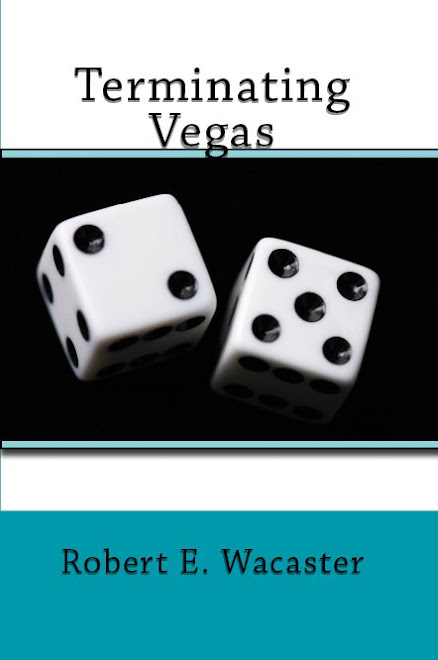So, you want to write a book and get it published? The world of publishing has come into revolution! It's so different today than it was even 5 years ago! Want to know what it used to be like? Well listen up, people!
Traditional Publishing
Digital publishing was just starting to get going 5 years ago, so let's go back 10 years. Just ten years ago if you wanted to get a book published, things were pretty complicated. Here's how everything worked...or didn't work, if you ask me. After writing your novel, you would need to write a query letter for it. This basically told the entire plot in a page or two. You would try to make your book sound as exciting and interesting as you could, and then you could submit it to a publisher. BUT, most publishers wouldn't accept submissions from just anyone. They would only take submissions from "agents".
Agents? What the hell? Why...? Well, never mind the why for now, let's hire an agent to sell our book! Now you have to interest an agent in your book before they will "take you on". You can't just hire someone, you first have to send your query letter to them and then if they think the book looks interesting and might sell, they'll take you on for a percentage of your book sales...IF they can get a publisher to buy the rights to your book. This can take months of trying, and come with lots of rejection letters. I've tried this, and didn't really even get letters back. I got back form letters that weren't even signed by a person. So I then had to wonder if anyone had even READ my query letter!
Ok, let's pretend that we did finally get accepted by an agent. We'll call him Fred. Fred now goes out and tries to get all the publishers who work with him to buy the book. "It's fantastic!" He tells them, as he's also trying to sell all the other authors and books he represents. So now not only has it taken you however long to write your book (some authors take years for just one novel!), it's taken us a couple of months to get accepted by Fred the agent. And then it takes Fred a few more months to sell your book to a publisher. Damn, I wanted my book out as soon as possible! Finally though, Fred negotiates a deal with a publisher and lets you know that your work will finally be published! You're so happy now, the world will get to read your story! Fred is a really good agent and has negotiated you a 10% royalty!
Wait...10% Just 10%? That's 10% of any money your book makes in sales. Yup, that would be considered a great deal with a traditional publisher! Some authors have gotten publisher deals for as small a 2% to 4% for royalties. Even though that's a really small number, you'll be getting your book and name out there, right? We'll see. Oh, and while we're talking money, your agent will receive an average of 10% to 15% of your royalties. Fred wants to get paid too! He's working for you, and so he has to get something, right? But is it really fair for him to get 15% when you're only getting a 10% royalty? Fred doesn't want to gouge you though, and agrees to only take 10% of your 10%. What a great guy Fred is!
Now Fred sends you the book contract from the publisher. This is the 50 page document agreement between you and the publisher (and Fred, so he can get his 10% of your 10%). At lot of the stuff is kind of hard to understand, but Fred has seen a lot of these and can answer most of your questions about what's in the contract. MOST of your questions. It's usually recommended that you take the contract to an attorney on your own and have him read it to see if it's fair. And even if it's not quite fair, you're going to want to sign the contract anyway because you really want your book to be published, right?
With traditional publishers, signing your contract usually comes along with an "advance". The publisher will estimate how many copies of the book will be sold and then advance the author a third of what their royalty payment would be. An average print book...now I'm saying AVERAGE...an average book will sell a run of 5,000 books during it's lifetime. I'll get to the lifetime of a book in a minute. So if the publisher thinks your book will sell around 5,000 copies, and they decide it will be priced at $14.95, you would get a royalty of around $7,475. Your advance for that would be about $2,490. And let's not forget Fred! Fred takes his 10% of your royalty advance, too! So he gets $249 of that. And this is just an advance on the amount of your books they hope to sell! If they don't actually sell enough to cover your advance, they're going to want some of the money back! Check your contract, Fred should have explained this.
Now the publisher moves on to the editing stage. After waiting for months and months, an editor gets back to you and tells you that they don't like chapter 8. They want it removed, and they want chapter nine rewritten so that cousin Elmo doesn't die when the electric blender explodes. But cousin Elmo dying is a major plot point, you think to yourself! In chapter 10 all the other characters go to his funeral! Oh...and the editor also wants you to either rewrite, or lose chapter 10, Elmo's funeral. They want to completely change your book! (This doesn't always happen, but for this example, I'm showing something that major publishers sometimes do.) You tell the editor that you don't feel comfortable with removing chapters, or rewriting the plot. He tells you that you either cooperate, or take your book someplace else. Read your contract, Fred should have explained that they have complete control of the editing and are entitled to make any changes they want.
It's not really fair, but you change the book around and get things written the way the publisher's editor wants. He take months and months to review things. Sometimes they can take up to a year just to edit a book. (This is for fiction books. Non-fiction books can go a bit quicker.) Now someone sends you the picture of what your book's cover will look like. You aren't really thrilled, but actually have no say at all in the matter. If you complain, or ask for changes, it's possible they'll consider you "difficult" and cancel the contract. Damn. Once again, not really fair! But you accept cover, and a "proof" of the book is printed for the editor to look over. They might even send you a copy of the proof for your book. After the proof is approved, they begin printing the books. Now remember, in the earlier paragraph we decided the publisher thought your book would sell around 5,000 copies? That's all they have printed up. These all get shipped to a warehouse somewhere and then from there they will go to bookstores for people to buy.
Now comes another hard part. Bookstores are only so big. They get new books in every week, if not every day! They all go up on the shelves, but being a new author, your book probably isn't going to be setting on some big display somewhere. Those spots are for Stephen King books, or Harry Potter books, or something that is sure to sell major copies. So your book is put up on a shelf and waits to be sold. Most books, if they don't sell within 3 months, will be sent back to the publisher. Back to the warehouse. And after so long, if your book isn't selling, it'll be discontinued. Now it's done. You've made what you've made from it, and that's the end. Since publishing is a business, most major publishers now only want to put out books by celebrities, or known authors. They only want books that are sure to sell. They won't take any chances. This also hurts readers. You can't find the next new, great author because all there are in the book stores are books by Snookie and Kathie Lee Gifford.
Digital Publishing
Now let's take a look at the new revolution in books, digital publishing! I am so thrilled by this, it's almost hard to put into words! Digital publishers put out books for electronic devices like the Kindle, or Nook, or iPhone and iPad. People love these, and so do I! So how do you get your book published by a digital publisher? You can always self publish your book, but that's a whole different story. For digital publishing, you don't need an agent. So long Fred! You were a big help (sort of) with the major publisher, but now we don't need you anymore! Back to the beginning, you write your novel. You're then going to email a short query letter to the digital publisher of your choice, and if your story isn't very long, you also attach the entire manuscript to the email. The publisher will take a look at your work and then either email you back a rejection (I'm sorry, but your book just isn't what we're looking for at this time.), or an acceptance and a contract. I've had two books accepted by two different publishers and one took around 5 weeks to get back to me, the other one accepted my book within a week.
Wow, back to contracts again. I didn't need a lawyer for the contracts I received from the digital publishers I work with. They were written in plain English for the most part, and I completely understood exactly what was expected of me, and what the publisher would be expected to do. And if I had any questions at all, all I had to do was ask. Not ask Fred the agent, ask the publisher. They were very friendly and helpful! What a change from traditional publishing, huh? No agent, no lawyer to look over the contract! Wow!
A lot of time digital publishers won't give you an advance on your work. I've known a couple authors who have gotten advances, but they've established themselves, and have plenty of other stories published. It helps if you've got other work out there. And as for royalties, digital publishers pay on an average of 40% to 60% royalties on your book. 60% is on the high side, but some will actually pay that. Now we move on to the editing. When I first heard from the editor assigned to my book, he told me that if I didn't like any changes, to let him know and not accept them. He wanted to make sure my story didn't change, and wanted to make sure I was completely happy with everything. He wanted...completely...no...HOLY COW, SO I CAN STILL KILL OFF COUSIN ELMO IN CHAPTER 9? The funeral scene is back in chapter 10? I love these guys! No mention of "Do it our way, or we'll drop your book!" No demanding changes to my manuscript! This is great!
Next you hear from the cover artist. When you sign your contract with a digital publisher, some also have you fill out a sheet telling what you'd like your book's cover to look like. The cover I've received so far didn't look like what I asked, and the artist apologized to me for that. But she didn't just force the cover on me, she ASKED for my approval. If I didn't like it, she would have done up something else for me. COVER APPROVAL? I'm...I'm just stunned by this! I asked for one change on the cover, and she was happy to do it for me. No one called me difficult. No one threatened to drop the book.
Now the book is scheduled to come out. Since it's digital, the publisher doesn't have to worry about printing copies. You don't have to worry about space on a shelf for your book, it gets put up on a website. And will even be put up on bookstore's websites for people to see! Your book goes on Amazon.com for the Kindle, on Barnes & Noble for the Nook, and in the Apple iBooks store! It's out there, and people can see and buy it! And best of all, it doesn't just disappear in 3 months! It may sell a few copies, but even if it isn't selling thousands of copies a month, it'll still be up for people to see and maybe buy later! Your book doesn't have to be discontinued...EVER!
For the digital publishers, your contract runs for so many years. The contracts I've gotten are for 2 years. After 2 years if you want the rights for your work back, you get them back. If you're still happy with the publisher, you can let them keep the rights for another 2 years, or whatever your contract says. Digital publishers are fantastic for readers! You can now find new authors everywhere! Digital publishers will take a chance on you if your story is good! You can find all kinds of new works and writers out there, and quite often writers will even put a digital short out there for free! This helps promote the books they have for sale! You can even usually download the first few chapters of a book as a sample to see if it really interests you.
So, here's is my final determination:
Traditional Publishing = Do what I say, or else!
Digital Publishing = Let me help you get your work out there!
I love digital publishing.





